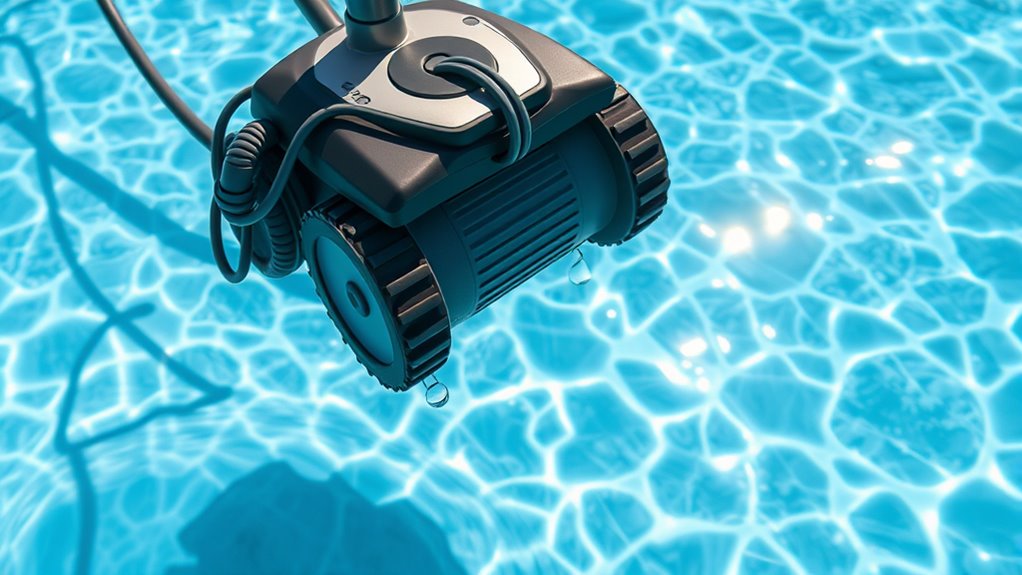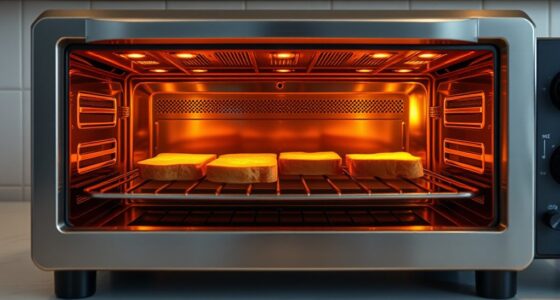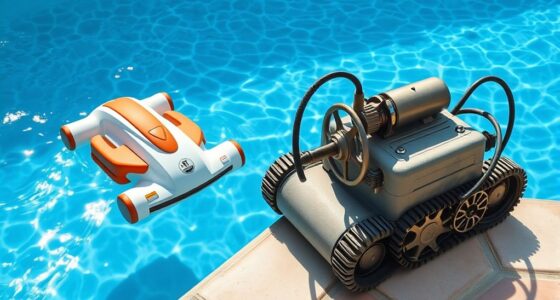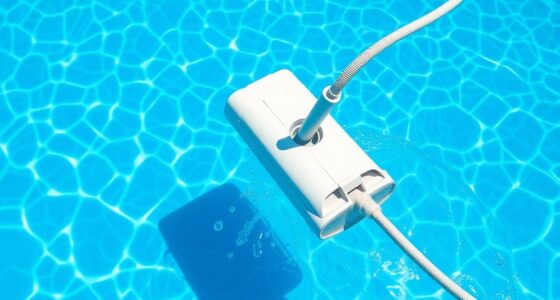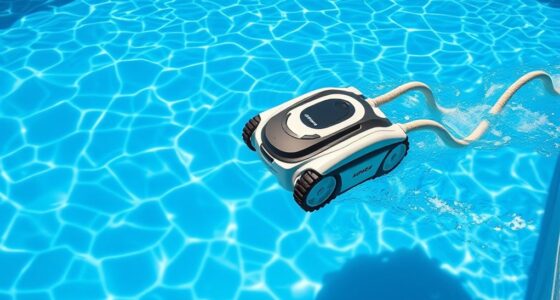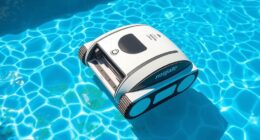To guarantee your suction pool cleaner works effectively, avoid neglecting regular maintenance like cleaning hoses, brushes, and inspecting parts for damage. Make certain your water chemistry is balanced to prevent clogs and damage. Proper setup is vital; attach hoses correctly and keep the vacuum head moving freely. Routine checks during use help catch issues early and extend your cleaner’s lifespan. Keep these tips in mind, and you’ll maximize your cleaner’s performance—more useful tips are ahead.
Key Takeaways
- Neglecting regular maintenance of hoses, brushes, and parts reduces suction efficiency and risks equipment damage.
- Failing to properly balance pool chemistry can cause clogs, calcium buildup, and damage to the cleaner.
- Incorrect setup or hose attachment can lead to missed spots, tangles, and inefficient cleaning.
- Ignoring routine checks like emptying baskets and inspecting for wear shortens equipment lifespan.
- Not adjusting flow rate or ignoring manufacturer instructions decreases cleaning effectiveness and causes malfunctions.
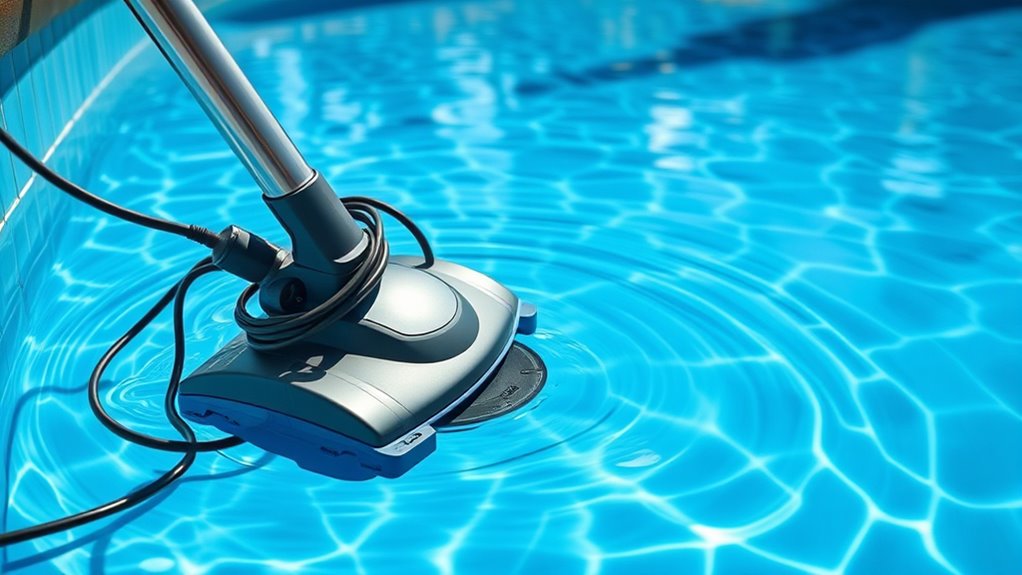
Using a suction pool cleaner might seem straightforward, but many pool owners make common mistakes that can reduce its effectiveness and lead to unnecessary issues. One of the most overlooked aspects is equipment maintenance. If you neglect regular checks, your cleaner’s performance will decline. For example, hoses can develop leaks or become clogged, which hampers suction power. It’s essential to regularly inspect and clean the hoses, brushes, and other parts to guarantee they’re free of debris and in good condition. Failure to do so not only reduces cleaning efficiency but also puts additional strain on the motor, potentially shortening its lifespan. Keeping your equipment well-maintained ensures the cleaner operates smoothly and effectively, saving you time and money in the long run. Regular maintenance also helps identify worn or damaged parts early, preventing costly repairs or replacements down the line. Incorporating preventative maintenance into your routine can help you spot issues before they become major problems and improve overall equipment longevity.
Regularly inspect and clean your pool cleaner’s hoses and parts to maintain optimal performance and extend its lifespan.
Another critical factor often ignored is pool chemistry. Many pool owners assume that simply running the cleaner is enough to keep the pool pristine, but imbalanced water chemistry can cause issues. For instance, high pH or alkalinity levels can lead to calcium buildup, which can clog the suction lines or damage the cleaner’s components. Conversely, low sanitizer levels can promote algae growth, which the cleaner might not remove entirely if the water isn’t properly balanced. Before using your suction cleaner, it’s wise to test your pool water regularly and adjust chemicals accordingly. Maintaining proper pool chemistry not only makes your cleaning efforts more effective but also prevents damage to your equipment. Clean water allows the suction cleaner to pick up debris more efficiently and reduces the chances of clogs or mechanical failures. Additionally, understanding the importance of water chemistry balance can help you better assess the cleanliness and clarity of your pool water, ensuring an optimal visual experience. Proper water balance also extends the lifespan of your pool’s filtration system and other components.
Many pool owners also overlook the importance of proper setup and positioning of the cleaner. Ensure the hose is correctly attached and that the vacuum head can move freely across the pool surface. Incorrect setup can lead to missed spots or tangled hoses, undermining the cleaner’s purpose. Additionally, if the cleaner is not compatible with your pool’s size and shape, it might struggle to perform effectively. Reading the manufacturer’s instructions carefully and adjusting the settings as needed can prevent many common problems. Taking the time to set up your cleaner correctly ensures maximum coverage and efficiency during each cleaning cycle. Proper setup not only improves cleaning results but also reduces the likelihood of equipment malfunctions caused by improper use. To further optimize performance, consider adjusting the flow rate, which can enhance cleaning efficiency and prevent unnecessary strain on the system.
Finally, don’t forget that a suction pool cleaner is a tool that requires consistent care. Regularly empty the skimmer and pump baskets, and monitor the cleaner’s operation during each use. By paying attention to equipment maintenance and keeping your pool’s chemistry balanced, you’ll ensure your suction cleaner works efficiently, lasts longer, and keeps your pool sparkling clean with less hassle. Avoiding these common pitfalls means you’ll spend less time troubleshooting and more enjoying your clean, inviting pool. Incorporating preventative maintenance into your routine will help keep your equipment in top shape and ensure optimal performance over time.
Frequently Asked Questions
How Often Should I Replace My Suction Pool Cleaner’S Filter?
You should replace your suction pool cleaner’s filter based on your filter maintenance routine and the replacement schedule recommended by the manufacturer. Typically, check the filter weekly during regular use, and clean it thoroughly. Replace the filter every 1 to 2 years or sooner if you notice decreased performance or tears. Regular maintenance ensures your cleaner operates efficiently, saving you time and preventing costly repairs.
Can I Leave the Cleaner in the Pool Overnight?
Imagine waking up to a clean pool every morning—that’s tempting, but leaving your suction pool cleaner overnight isn’t recommended. It can impact pool safety if the cleaner obstructs circulation or creates debris buildup. Plus, it affects energy efficiency, as running the pump continuously isn’t ideal. To keep your pool safe and efficiently maintained, it’s best to remove the cleaner after use and store it properly.
What’S the Best Way to Store the Cleaner During Winter?
For winter storage, you should clean your suction pool cleaner thoroughly and disconnect it from the pool system. Store it in a cool, dry place indoors to prevent damage from freezing temperatures. During off-season maintenance, inspect hoses and brushes for wear. Proper winter storage guarantees your cleaner stays in good condition, ready for next season. Avoid leaving it outside or exposed to moisture, which can cause mold or deterioration.
How Do I Troubleshoot if the Cleaner Stops Moving?
If your suction pool cleaner stops moving, start with a manual inspection to check for obstructions or debris blocking the brushes or wheels. Next, troubleshoot the motor by listening for unusual sounds or vibrations. Confirm the hoses are properly connected and free of leaks. Sometimes, cleaning the filter or replacing worn parts can restore proper operation. Regular maintenance keeps your cleaner running smoothly and prevents future issues.
Is It Necessary to Manually Remove Debris From the Cleaner?
They say “an ounce of prevention is worth a pound of cure,” and that’s true for your pool cleaner. You should manually remove debris regularly and perform filter maintenance to guarantee ideal performance. Debris removal prevents clogs, while clean filters keep suction strong. Skipping these steps can cause your cleaner to stop moving or work inefficiently. Stay proactive, and your pool stays spotless with less hassle.
Conclusion
To keep your pool sparkling, avoid these common suction cleaner mistakes. Did you know that regular maintenance can extend your cleaner’s lifespan by up to 30%? Staying attentive to proper setup and usage not only saves you time and money but also guarantees a cleaner, healthier pool. So, take care of your equipment and enjoy crystal-clear waters all season long—your perfect swim starts with avoiding these simple errors.
